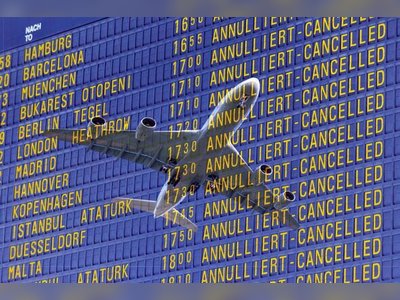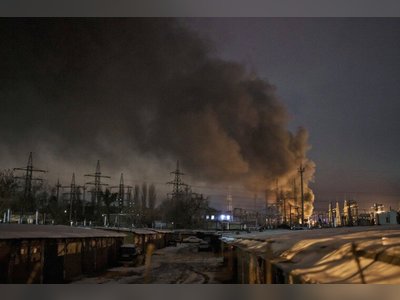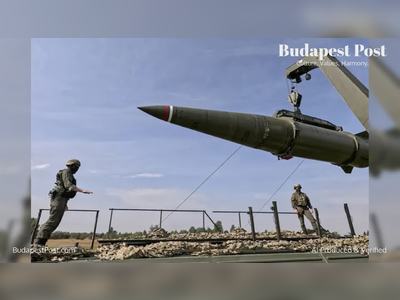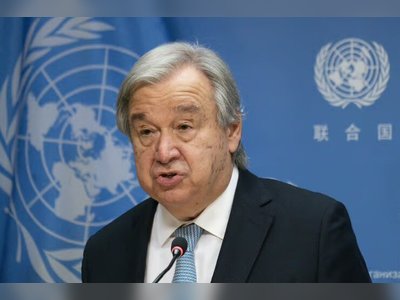Hungarian Troops Combatting the Roots of Terrorism in Chad
Hungarian Defense Forces Deploy to One of the World's Poorest Regions.
Compared to other nations, Hungarian soldiers in Afghanistan experienced relatively few atrocities. This fact is due in large part to the distinct policy represented by the Hungarian Defense Forces and behind them, the government which diverged from that of countries like the United States. Instead of forcing democracy onto the population of Baghlan province, particularly in Pol-e Khumri, at all costs, we accepted that locals have a different system of daily life than ours. This likely contributed to the government of Chad inviting us to participate in the local peace mission.
The problems of Africa should not be resolved in Europe, and certainly not solely by us, but on the continent itself. If there is peace there, then the pressure of illegal migration will also diminish which is good news for citizens of the old world alike. This can perhaps be succinctly summarized as the rationale for why the Hungarian Defense Forces are participating in the peace mission in Chad at the request of the Chadian cabinet. It is not with a large contingent, merely two hundred people (up to double this number during rotation periods). To understand what we are doing in the heart of Africa, it is worth delving into the region's past.
Especially considering that upon closer inspection, we find that in the past few years, the Sahel zone has become a hotbed or fortress, if you will, of global terrorism. It is indicative of the situation there that in 2022, forty-three percent of the victims of extreme violence perished in this area. This is collectively more than the senseless terror that claimed lives in South Asia, the Middle East, and North Africa combined.
The word "Sahel" actually means border, in our case, the edge of the desert. Geographically speaking, the troubled and divided region for decades includes Western Sahara, Mauritania, Mali, Burkina Faso, Niger, and particularly pertinent to our article Chad. Its area is approximately 5.6 million square kilometers with a slight exaggeration, fifty-six truncated Hungarys could fit into it. Its length is roughly four thousand and width one thousand kilometers, with the desert occupying 2.5 million square kilometers. With fewer people living in this latter part, fifty-seven million people reside in the remaining 3.1 million square kilometers. The Sahel thus is in fact Africa's most sparsely populated and poorest region, recently heavily affected not just by climate change, but also by Islamic terrorism.
International military literature generally illustrates the rise of Islamist terrorism with five explanations. These are, in order, dissatisfaction with the political order, dismal governance, ultra-high levels of corruption, ethnic competition/conflicts, and the staggeringly high unemployment rate among youth.
It may not be uninteresting to note that Chad, with an area of 1.284 million square kilometers and approximately 17.5 million inhabitants, is currently one of the world's poorest nations a sad consolation for a country that at least outpaces Afghanistan in this regard. The region was colonized by Paris in 1890 and then became part of French Equatorial Africa in 1920. When this broke up in 1958, it was included as an autonomous republic among the members of the French Community.
As with most African countries, independence gained in 1960 did not bring peace to Chad. Almost immediately, a battle commenced between the northern Muslim pastoralists and the southern, primarily agricultural, populace, leading to a division of the state. (This fault line is still apparent today.) Seizing the "great" opportunity, the northern neighbor Libya eagerly entered the war and occupied the mineral-rich, albeit disputed border region, the Aouzou Strip. Eventually, the two parts of the country reached an agreement, with Libyan troops neatly returning through the desert to their homeland. However, it was hardly advisable to bet on peace, as the sides turned on each other again in the latter half of the 1990s.
Idriss Déby Itno previously led the nation for about three decades, but this authoritarian figure died under unclear circumstances in 2021. Some say he passed away simply, others talk of asphyxiation, and yet others of a heart attack but as in a good P. Howard novel, here it may be that everything is due to a simple bullet, spoonful of poison, or sharp knife appropriately placed in the corner of the body of an aged rival by a potential successor.
Returning to the ground of realities, let's look at Chad's religious data: according to this, fifty-five to sixty percent of the population is Muslim, while the vast majority of the remainder are Christian. Protestants make up twenty-four percent and Catholics twenty, but there are also animists, neo-Christians, and those completely without religion. A significant portion of the Muslims living there are followers of mystical Islam, i.e., the moderate branch of Sufism.
In terms of racial distribution, the most populous group is the Sara people living in the south, black-skinned but of Hamitic origin, making up nearly a third of the population. The proportion of blacks who immigrated from Sudan can be estimated at twenty-seven percent. The Teda are dark-skinned Hamites, related to Arabs, nearing eight percent. Other ethnic groups are Sudanese: Mbum at seven percent, Masalit, Maba, Mimi together seven, Tama six, Mubi four, and Kanuri, Masa, and Kotoko groups each represent two percent.
That Islamist factions are not exactly fond of Christians may need no further explanation. The financial backers of the fundamentalists are primarily traders who belong to the relatively high-income groups and profited handsomely during the Idriss Déby Itno era. These influential supporters of the late authoritarian president shudder at most things we Europeans call democratic.
Adding to this is the fact that locals like the French about as much as a noble steed likes muddy water, casting Paris' endeavors in the past few years in a rather dim light. Many perceive the former colonizers as the biggest obstacle to democracy and the spread of Islamism.
In summary, there is currently strong chaos in the region. The Hungarian troops will be stationed in the African nation based on the resolution of the Hungarian Parliament and the request of the Chadian president dated September 19, 2023, in N'Djamena, until December 31, 2025. Their deployment will be determined as needed. Their primary tasks are advisory, support, and battlefield mentorship services, protecting Hungarian nationals and domestic interests located there, and supporting the fight against terrorism.
If necessary, they will cooperate with allied international forces.
The problems of Africa should not be resolved in Europe, and certainly not solely by us, but on the continent itself. If there is peace there, then the pressure of illegal migration will also diminish which is good news for citizens of the old world alike. This can perhaps be succinctly summarized as the rationale for why the Hungarian Defense Forces are participating in the peace mission in Chad at the request of the Chadian cabinet. It is not with a large contingent, merely two hundred people (up to double this number during rotation periods). To understand what we are doing in the heart of Africa, it is worth delving into the region's past.
Especially considering that upon closer inspection, we find that in the past few years, the Sahel zone has become a hotbed or fortress, if you will, of global terrorism. It is indicative of the situation there that in 2022, forty-three percent of the victims of extreme violence perished in this area. This is collectively more than the senseless terror that claimed lives in South Asia, the Middle East, and North Africa combined.
The word "Sahel" actually means border, in our case, the edge of the desert. Geographically speaking, the troubled and divided region for decades includes Western Sahara, Mauritania, Mali, Burkina Faso, Niger, and particularly pertinent to our article Chad. Its area is approximately 5.6 million square kilometers with a slight exaggeration, fifty-six truncated Hungarys could fit into it. Its length is roughly four thousand and width one thousand kilometers, with the desert occupying 2.5 million square kilometers. With fewer people living in this latter part, fifty-seven million people reside in the remaining 3.1 million square kilometers. The Sahel thus is in fact Africa's most sparsely populated and poorest region, recently heavily affected not just by climate change, but also by Islamic terrorism.
International military literature generally illustrates the rise of Islamist terrorism with five explanations. These are, in order, dissatisfaction with the political order, dismal governance, ultra-high levels of corruption, ethnic competition/conflicts, and the staggeringly high unemployment rate among youth.
It may not be uninteresting to note that Chad, with an area of 1.284 million square kilometers and approximately 17.5 million inhabitants, is currently one of the world's poorest nations a sad consolation for a country that at least outpaces Afghanistan in this regard. The region was colonized by Paris in 1890 and then became part of French Equatorial Africa in 1920. When this broke up in 1958, it was included as an autonomous republic among the members of the French Community.
As with most African countries, independence gained in 1960 did not bring peace to Chad. Almost immediately, a battle commenced between the northern Muslim pastoralists and the southern, primarily agricultural, populace, leading to a division of the state. (This fault line is still apparent today.) Seizing the "great" opportunity, the northern neighbor Libya eagerly entered the war and occupied the mineral-rich, albeit disputed border region, the Aouzou Strip. Eventually, the two parts of the country reached an agreement, with Libyan troops neatly returning through the desert to their homeland. However, it was hardly advisable to bet on peace, as the sides turned on each other again in the latter half of the 1990s.
Idriss Déby Itno previously led the nation for about three decades, but this authoritarian figure died under unclear circumstances in 2021. Some say he passed away simply, others talk of asphyxiation, and yet others of a heart attack but as in a good P. Howard novel, here it may be that everything is due to a simple bullet, spoonful of poison, or sharp knife appropriately placed in the corner of the body of an aged rival by a potential successor.
Returning to the ground of realities, let's look at Chad's religious data: according to this, fifty-five to sixty percent of the population is Muslim, while the vast majority of the remainder are Christian. Protestants make up twenty-four percent and Catholics twenty, but there are also animists, neo-Christians, and those completely without religion. A significant portion of the Muslims living there are followers of mystical Islam, i.e., the moderate branch of Sufism.
In terms of racial distribution, the most populous group is the Sara people living in the south, black-skinned but of Hamitic origin, making up nearly a third of the population. The proportion of blacks who immigrated from Sudan can be estimated at twenty-seven percent. The Teda are dark-skinned Hamites, related to Arabs, nearing eight percent. Other ethnic groups are Sudanese: Mbum at seven percent, Masalit, Maba, Mimi together seven, Tama six, Mubi four, and Kanuri, Masa, and Kotoko groups each represent two percent.
That Islamist factions are not exactly fond of Christians may need no further explanation. The financial backers of the fundamentalists are primarily traders who belong to the relatively high-income groups and profited handsomely during the Idriss Déby Itno era. These influential supporters of the late authoritarian president shudder at most things we Europeans call democratic.
Adding to this is the fact that locals like the French about as much as a noble steed likes muddy water, casting Paris' endeavors in the past few years in a rather dim light. Many perceive the former colonizers as the biggest obstacle to democracy and the spread of Islamism.
In summary, there is currently strong chaos in the region. The Hungarian troops will be stationed in the African nation based on the resolution of the Hungarian Parliament and the request of the Chadian president dated September 19, 2023, in N'Djamena, until December 31, 2025. Their deployment will be determined as needed. Their primary tasks are advisory, support, and battlefield mentorship services, protecting Hungarian nationals and domestic interests located there, and supporting the fight against terrorism.
If necessary, they will cooperate with allied international forces.
AI Disclaimer: An advanced artificial intelligence (AI) system generated the content of this page on its own. This innovative technology conducts extensive research from a variety of reliable sources, performs rigorous fact-checking and verification, cleans up and balances biased or manipulated content, and presents a minimal factual summary that is just enough yet essential for you to function as an informed and educated citizen. Please keep in mind, however, that this system is an evolving technology, and as a result, the article may contain accidental inaccuracies or errors. We urge you to help us improve our site by reporting any inaccuracies you find using the "Contact Us" link at the bottom of this page. Your helpful feedback helps us improve our system and deliver more precise content. When you find an article of interest here, please look for the full and extensive coverage of this topic in traditional news sources, as they are written by professional journalists that we try to support, not replace. We appreciate your understanding and assistance.














